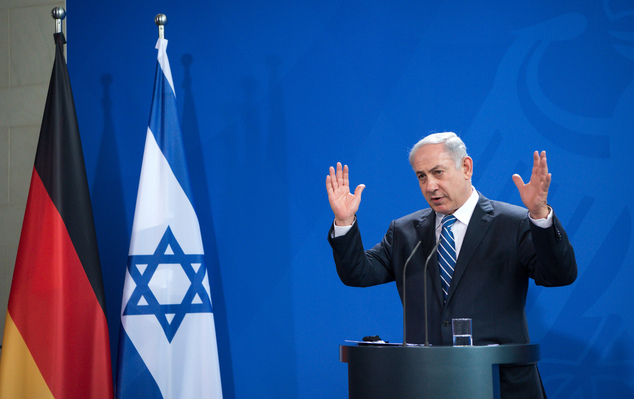In Berlin, Netanyahu praised Jerusalem’s improved relationship with the EU, stressing that Israel has not given up its basic interests while mocking the latest French peace initiative.
Appearing at a joint press conference in Berlin with German Chancellor Angela Merkel, Israeli Prime Minister Benjamin Netanyahu slammed the latest French effort to impose a solution to the Palestinian-Israeli conflict, which, he said, would predetermine the outcome and disregard profound security issues.
“The French initiative, as it has been published, is questionable,” Netanyahu explained. “It says: We will hold an international conference, but if you do not succeed, we are already predetermining the result – we will recognize a Palestinian state. It does not matter if this state could become another Islamic dictatorship, one of many in the Middle East. It does not matter if it will not genuinely commit to ending the conflict and recognizing the state of the Jews. It does not matter if there will not be security arrangements that will prevent the capturing of territory that Israel would be due to evacuate by Daesh (Islamic State) or Hamas or both of them. It does not matter. We will determine that there is a state, without any conditions regarding recognition, security or anything.
“Of course, this ensures that this conference will fail,” he continued, “because if the Palestinians know that their demand will be met a priori, and they do not need to do anything, then there is certainly an internal contradiction here, because they will not do anything. There is one way to advance peace – direct negotiations without preconditions between the sides. This is the true way, and I think that anyone who tries to deviate from it will not advance successful negotiations.”
The Israeli leader welcomed the improved relationship between Israel and the European Union (EU) “without conceding our basic interests.”
“We stand on our positions,” he stated, clarifying that EU Foreign Policy chief Federica Mogherini agreed clearly on major issues: “First, they will not surprise us with further initiatives. Second, they are against BDS and boycotts. What they have determined does not relate to the setting of the permanent borders of the State of Israel in a future agreement.”
Israel is the Solution, Not the Problem
Of major importance, Netanyahu continued, is that the Jewish state is treated fairly, especially since Israel is “not the root of the problem in the Middle East; we are part of the solution.”
“If Israel would not be there, the Middle East would be inundated,” he said. “The entire western part of the Middle East would be flooded by the forces of radical Islam and many more millions would ride this flood to Europe. Israel is a defensive shield of Western civilization in the heart of the Middle East.”
Netanyahu also discussed the controversy surrounding European NGOs in the region who, according to documentation, have assisted Palestinian efforts against the interests of Israel. The Jerusalem government is working to pass a stipulation, among other requirements, that lobbyists for NGOs who receive most of their funding from foreign governments wear identity tags in the Knesset.
“The NGO bill is one of transparency. It’s not one of censorship,” he declared. “It says that if a government, a foreign government is assisting this or that NGO, it should be open and people should know about it. There are such laws in other countries, especially in the United States. No law is exactly analogous to the other, but that’s the principle. And so what we want is mere transparency.”
Merkel acknowledged that “now is certainly not the time to make comprehensive progress, but you can achieve improvements in certain places,” she said, reiterating EU policy that a two-state solution is the ultimate goal for a peaceful coexistence.
By: Terri Nir, United with Israel
